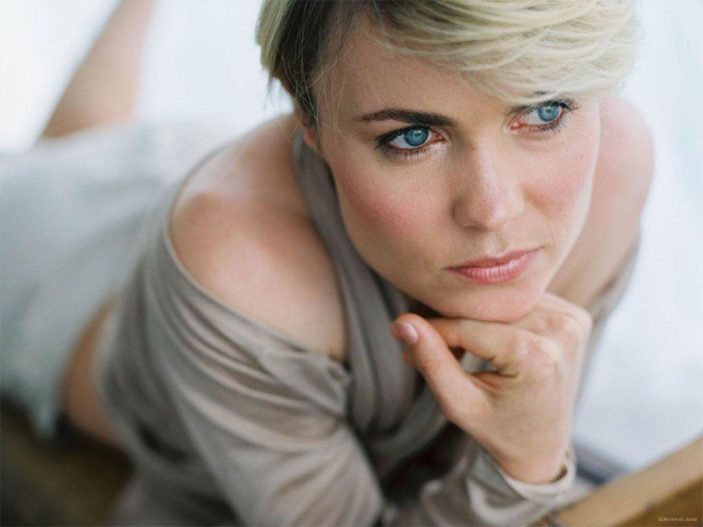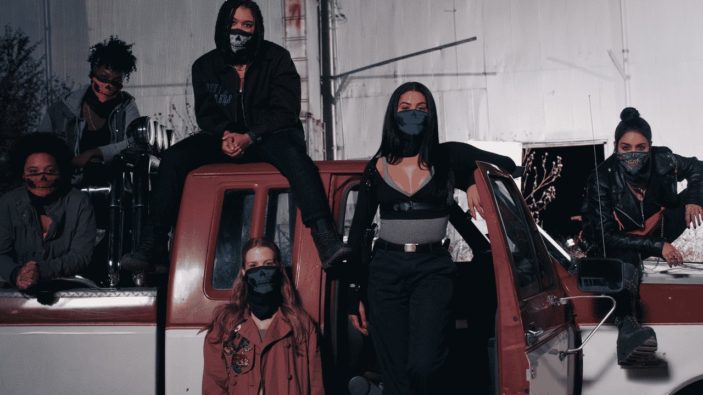
One of Australia’s finest, and hardest working, exports, Radha Mitchell is a homegrown success story, having graduated from the local screens of the sitcom All Together Now and the institution that is Neighbours, to such international box office successes as Pitch Black, Phone Booth, and Silent Hill.
As her latest film, the darkly comedic revenge thriller Asking For It (you can read our review here) opens across the United States, our own Peter Gray chatted with the actress about the film’s controversial material and its subsequent reception (“Some people didn’t want to talk to each other after seeing it”), how it was working with a predominantly female cast (“They were loud and brash and very “f**k you”), and her feelings on Neighbours coming to a close after 37 years on air (“I don’t really like that.”).’
I always appreciate going into movies completely blind, and I was unprepared for so much of what took place, and I mean that in a positive way. When you first received this script, what’s your reaction?
I was in an usual situation, even for myself. I was in Texas making a movie about a high-school shooting, produced by a bunch of republicans (laughs). So I’m reading this script and they needed someone quickly. And I was in a neighbouring state, so I said “Sure”, and I was reading the script and I was smiling and laughing because it was so fun and irreverent and outrageous.
It was so polarising to where I was (at the time) playing a mum, drinking coffee, guiding her child, but then the mum was a ghost, and the dad was a hunter (laughs), so the characters I was around were these rednecks with pistols. And this (Asking For It) was the other extreme. So to be able to just cross the border and go into this other headspace was really interesting. Obviously this character was great, and the talent involved I was excited to work with them all.
I’ve had the privilege of working with a share of female directors so I’ve been a part of that female lens, but things have been skewed for some time. In this case, I felt like even the collective of actresses that were able to inhabit another part of themselves that they would normally not reveal was a nice thing to share with them.
This film doesn’t shy away from the type of subject matter that makes people uncomfortable. It’s very topical, especially given the last few years. Are you, as an actress, seeing a shift in the type of material being written about women taking back autonomy over themselves?
Yeah, especially recently. I mean, I’m doing a new film where I get to play the bad guy, which I can’t wait to do. Very bad guy, the murderously bad guy. I once spoke to Thich Nhat Hanh, this spiritual leader, and he advised “Always play the hero. Never play the negative character.” And I remember saying “Isn’t it cathartic to play that?”, and he said I would just be rehearsing my own negativity, but I think it is cathartic, especially this movie. I think it’s cathartic for women to see violent, empowered characters that are women because, subversively, we are subjected to seeing ourselves victimised.
To see a role reversal, even if it’s a cartoonish, outrageous, ass-kicking, B-grade movie…I think it has a subliminal effect. It’s really great. I showed it to some people in Australia, just some friends, and it was controversial at the screening. Some people didn’t want to talk to each other after seeing it (laughs) and I thought that was kind of exciting and a bit naughty to create that controversy and discomfort. For the women in the audience, they liked it. My aunt, who’s in her seventies was just like “Yeah!”
I would love to watch this with an audience. I would love to watch this with a queer audience, because I think we instinctively embrace any type of material that shows women kicking the shit out of men…
(Laughs) I don’t know why…I think it’s kind of gratifying to see that. They deserve a bit of a slap, at this point.
What’s also great about this film is that it says and does all the things we sometimes wish we could say and do. Kiersey Clemons’ character is essentially the audience’s eyes into this world, and your character is that type of figure guiding us through…
There’s action to the anger. It turns it into a force that’s an overwhelming experience, but it’s one that you can create your own reckoning. That revenge is the fantasy. That you can do something so powerful with those feelings. I don’t think the movie is saying that it’s necessarily the right choice, but it’s certainly saying that it is a choice. Often it isn’t considered. Those 1970’s movies it was always the women getting beaten up, and I think that has a certain subliminal effect in creating an identity, especially for young women. I think we’re more empowered than we think.
Was the final version of the film the way you had envisioned it?
I had no idea. I was thinking “Is this like a David Lynch thing?”, I really had no idea. Is it like Dorothy in The Wizard of Oz, and she’s going on a trip? It was a lot snazzier in the edit than I had anticipated. It’s very loud and fast and brash. Some people might find it a bit much, but that’s what was so engaging to me.

I noted that the film’s writer and director, Eamon O’Rourke, has a background in both acting and as a production assistant. Because he knows how it is to be directed himself, did you find that he was easier to work with in that regard?
To be really frank, he didn’t have a lot of time or a lot of money, so it felt very much like a raw (experience). We didn’t really know a lot about him. The piece itself had a lot of elasticity to it, so there was a lot of experimentation but he was keeping it in control of his vision. He knew when it was too much or not enough. There was this cartoon vibe to it, but you don’t want that to be too outside of emotional authenticity.
What he did do to really educate people to the story he was telling was his crew very much related to the idea of being outsiders. There were transgender people on the crew. There were people that changed their sex on the crew. It embraced the community that it was talking to, in some ways. It was kind of outrageous that we were in this small town, Guthrie, Oklahoma, that had never seen anything like this. Ezra Miller was dressed up in a costume every day (laughs). People were encouraged to be themselves. That was very liberating. There was a lot of karaoke going on at bars every night. We were all staying in this one building. People who were used to glamorous lives were definitely slumming it, but it felt like this long slumber party. That was the energy of it.
You have a homegrown connection to Luke Hemsworth on the cast. Was it nice to have another Australian around?
It really was (laughs), it was really nice because it was bizarre going from Texas to Oklahoma, hanging out with rednecks to super left-wing liberals…there was a lot of cultural stuff going on, so to have another Aussie and to hear the accent was nice.
As you said, you had that long slumber party-like mentality when shooting and you came onto the project quite late in the game, did you find it was easy to slip in with the cast?
It was a bit of a challenge. I was thinking “Shit, my character is the leader” and these are young, interesting girls. They were in a mood. They were loud and brash and very “f**k you”, so you didn’t want to not fit into that mood. It was interesting to monitor that. Sal (my character) is in her own universe and very focused, whereas the other girls are all the attitude, so that was interesting to quickly figure out. I think Eamon captured that, which is why I think people are going to like this movie.
Leaving the film quickly. One of your big breaks was on Neighbours (in 1996), and that show is now officially coming to an end. How do you feel about that?
I don’t really like that. I don’t think anyone does. We all have had so much Neighbours and we probably don’t need anymore Neighbours, but we all thought we were going to have Neighbours. It’s that sense of something being so cosy, and when I come home it’s always on, and I’ve always appreciated that. And relating to the film industry, Neighbours has been such an educational ground for actors. It teaches you discipline and social dynamic. It teaches you a lot about the craft.
Asking For It is screening in select theatres, digital and On Demand in the United States from March 4th, 2022. An Australian release is yet to be determined.
